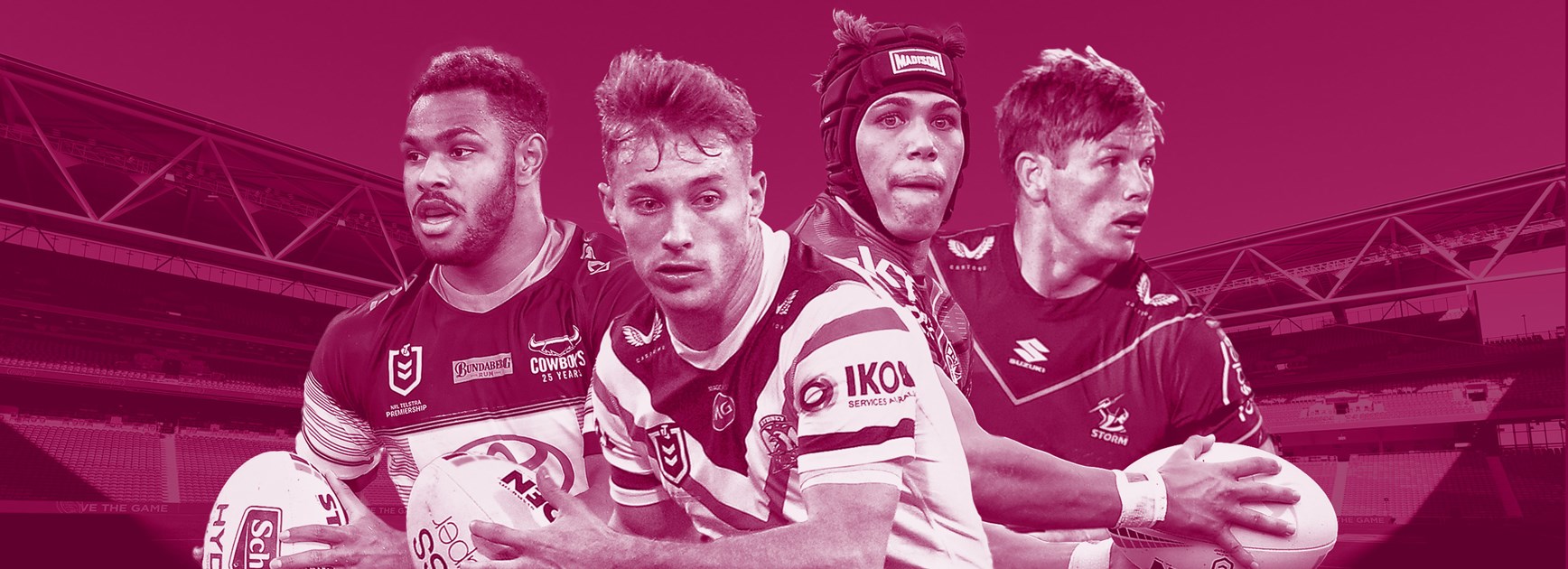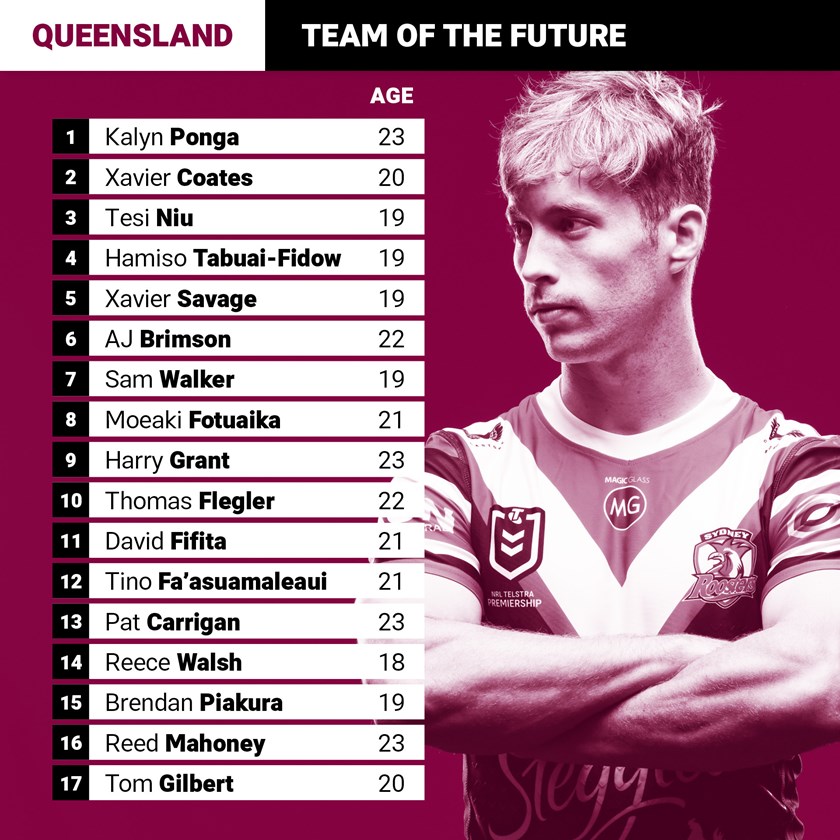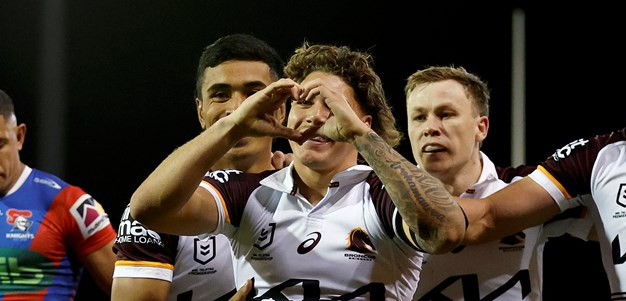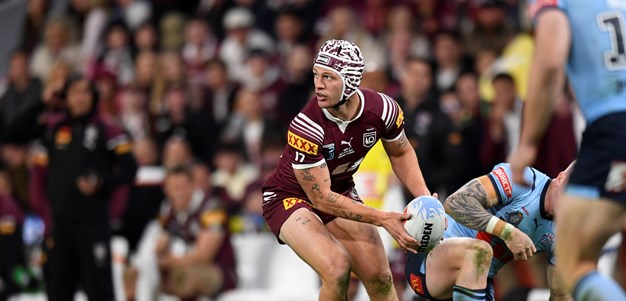
Ipswich Jets chairman Steven Johnson shared a photo of the 2019 Queensland Secondary Schools team ahead of Sunday night’s 26-0 shutout by NSW, with the message: “I think Queensland State of Origin will be OK from 2023 to 2033”.
After last year’s Maroons team used claims that they were the worst in Origin history as motivation to win the 2020 series, this year’s side is on track to officially earn that tag unless there is a massive turnaround in the final match on July 14.
However, Queensland’s future is far from bleak and as one Maroons official admitted on Monday, the difficulty for coach Paul Green is that following Wayne Bennett is like “batting after Bradman”.
Queensland were not supposed to win last year but Bennett conjured a miracle after taking charge at short notice during the first Origin series comprising back-to-back matches at the end of the season because of COVID-19.
Normal service has now resumed and the Maroons era of domination from 2006 to 2017 - during which the 2014 series was NSW’s only triumph - is little more than a memory, but Queensland’s production line of talent hasn’t stopped.
Reece Walsh, Sam Walker, Xavier Coates, Hamiso Tabuai-Fidow, Tesi Niu, Xavier Savage and Brendan Piakura have all played together for Queensland at schoolboys and junior representative level and are now starting to make the transition to Origin.

Coates was in the 2019 Maroons under-18s team which beat NSW 34-12 and has since played four Origins, while Walsh was set to make his debut on Sunday night but suffered a hamstring injury at training the day before.
Walsh, Walker, Tabuai-Fidow, Niu and Piakura were also members of the victorious under-18s team, while all but Niu were also in the 2019 Queensland Secondary Schools team, along with Savage – the Canberra speedster who made a controversial NRL debut earlier this month.
Niu played for the Maroons under-20s the same season, along with Cowboys prop Tom Gilbert, the 2019 Queensland Cup rookie of the year, and Titans star Tino Fa'asuamaleaui, who has been a regular member of the Origin team since last year.
David Fifita, Harry Grant and AJ Brimson also made the leap from Maroons junior representative teams to Origin last season and are set to become mainstays of the Queensland team for the next decade, along with Kalyn Ponga, Walker and Walsh.
All are 18 to 23 years-of-age, and were born in 1998 or more recently.
Despite being in their rookie NRL seasons, Walker and Walsh are among the top five players for try assists per game, along with Tom Trbojevic, Nathan Cleary and Cody Walker – not including players with less than five appearances in 2021.
Walker, Walsh, Grant and Ponga, who may become Queensland’s long-term spine, are in the top 10 players for line-break assists per game – not including players with less than five appearances this season
The introduction of a second Brisbane team in the NRL from 2023 would also be a boost for the Maroons as more players will have the opportunity to play in the NRL, if approved by the ARLC.
Thurston laments Maroons lost Origin moments
Bennett said south-east Queensland was set to boom in population and playing numbers.
"Of course it would open the door for more Queensland talent," Bennett said of a 17th NRL team in Brisbane. "The NRL knows it has to keep expanding the game into the growth areas of our population.
"Brisbane, Gold Coast, North Coast, Ipswich and west are the growth corridors of Queensland.
"There is a city called Springfield that sits south-west of Brisbane, and near Ipswich. It’s huge now and will continue to become a huge corridor of homes and business. Plus you have new suburbs all through those corridors.
"One of the best things the NRL is doing is only bringing one team in. That is very manageable.
Reece lightning bolts into Origin history
"The game has strong state leagues supporting the game as well, which we did not have the last time we expanded. It’s like all good businesses; you either grow or you disappear."
Expansion club would even up numbers game
NSW’s domination of this year’s Origin series has led to suggestions that there isn’t enough talent for a fourth Queensland team in the NRL as the ARLC considers applications for a second Brisbane franchise to join the premiership from 2023.
Yet Johnson recalls that critics had previously used Queensland’s eight-year winning streak from 2006 to 2013 to argue against the Western Corridor bid being awarded an NRL licence as they claimed the Maroons would continue to be too strong.
“They thought that if we had another side up here Queensland would keep dominating Origin and NSW would miss out,” said Johnson, who heads up the Brisbane Jets consortium with Nick Livermore.
“What they didn’t accept was that Queensland just had a freak era with about five once-in-a-lifetime players all playing at the same time.”
Johnson has been campaigning for 12 years for an NRL team representing Ipswich, Logan City and Toowoomba, and the Brisbane Jets are vying with the Dolphins (Redcliffe) and Firehawks (Easts Tigers) consortiums for an NRL licence if the ARLC decides to admit a 17th team.
Regardless of which bid is successful, Johnson believes another NRL team in Queensland would help ensure that Origin continues to be the most fiercely contested sporting event in Australia as it will provide opportunities for more players.
Contract kerfuffle: Green outlines events leading up to Mulitalo's exit
“We have only got 107,000 eligible players in Queensland whereas NSW has got 260,000 so unless you address that imbalance the jewel in the crown is going to be dead,” he said of Origin.
“It’s why we need to expand. There is just an under-representation of rugby league in Queensland and now it is starting to show up.
“Thirty per cent of the state’s players do not have an NRL connection. We would immediately take care of 18,921 players that currently get little attention, and the talent is already there.
“Just in Ipswich alone, with the quality of young players we have got, instead of producing eight to ten players every year that NRL clubs take we would produce double that.”
Where does series loss leave Paul Green?
Setbacks add to challenge of Origin
Green has faced a baptism of fire in his first Origin series as Maroons coach, with his selected fullbacks - Ponga in Origin I and Walsh in Origin II – both succumbing to injuries before the game.
Grant was injured before Origin II while playing for Melbourne and Green’s second-choice hooker, Reed Mahoney, suffered an injury after being released from Queensland camp to play for Parramatta ahead of the series opener.
In addition, the Maroons had to deal with the Ronaldo Mulitalo ineligibility drama on the eve of Origin II after the Cronulla winger was called in to replace the injured Walsh and Coates was drafted into the team just hours before kick-off as he was due to starting training with the Broncos.
However, the reality is that Queensland have been on an inevitable downward spiral since Cameron Smith, Johnathan Thurston and Cooper Cronk retired from Origin after the 2017 series, followed by Billy Slater and Greg Inglis a year later.
The Maroons lost in 2018 and 2019 but Bennett was able to inspire a remarkable victory against the odds last year after taking charge at short notice and with players in a bubble for the back-to-back Origin series played at the end of the NRL season.
Green was appointed Maroons coach for this season and as Ivan Henjak (Broncos), Steve Price (Dragons), Rick Stone (Knights) and Anthony Seibold (Broncos) have all discovered, following Bennett is a tough order.
The 2015 premiership-winning coach with North Queensland may also be finding that coaching Origin is different to NRL level, as Melbourne coaching guru Craig Bellamy discovered during his three-year stint in charge of NSW from 2008 to 2010.
The Maroons are expected to have Brimson (knee) back for Origin III, and possibly Walsh (hamstring), but Ponga (groin), Grant (hamstring) and Mahoney (shoulder) are unlikely to play for their clubs before the July 14 clash.
The views in this article do not necessarily express the opinions of the NRL, ARLC, NRL clubs or state associations.






